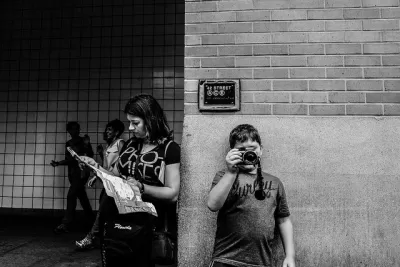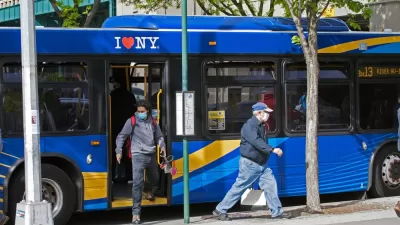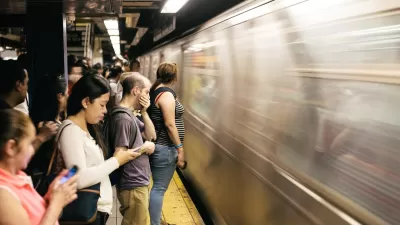Some trains are running faster in New York City. The New York Times created a series of infographics to show which lines have sped up, and by how much.

"Transit leaders say the subway is getting better as they work to overhaul the system, but riders are more likely to have felt the improvements on some lines than on others," reports Sergio Peçanha.
"Passengers of the E line saw their rides get faster by one minute and 14 seconds on average in May, compared with the same month last year. Riders of the L, J, Z and W lines, however, saw their average ride get a few seconds slower."
Peçanha is sharing the latest data from "additional train time" metric tracked by the Metropolitan Transportation Authority. To illustrate the findings described above, Peçanha presents a series of infographics.
The improvements are the result of hundreds of millions of dollars spent on repairs, "raising speed limits and fixing faulty signals." Subway officials also credit "changes in schedule, which the agency said allow trains to run more efficiently," for the improvements.
FULL STORY: Faster. How Did Your Line Do?

Maui's Vacation Rental Debate Turns Ugly
Verbal attacks, misinformation campaigns and fistfights plague a high-stakes debate to convert thousands of vacation rentals into long-term housing.

Planetizen Federal Action Tracker
A weekly monitor of how Trump’s orders and actions are impacting planners and planning in America.

In Urban Planning, AI Prompting Could be the New Design Thinking
Creativity has long been key to great urban design. What if we see AI as our new creative partner?

King County Supportive Housing Program Offers Hope for Unhoused Residents
The county is taking a ‘Housing First’ approach that prioritizes getting people into housing, then offering wraparound supportive services.

Researchers Use AI to Get Clearer Picture of US Housing
Analysts are using artificial intelligence to supercharge their research by allowing them to comb through data faster. Though these AI tools can be error prone, they save time and housing researchers are optimistic about the future.

Making Shared Micromobility More Inclusive
Cities and shared mobility system operators can do more to include people with disabilities in planning and operations, per a new report.
Urban Design for Planners 1: Software Tools
This six-course series explores essential urban design concepts using open source software and equips planners with the tools they need to participate fully in the urban design process.
Planning for Universal Design
Learn the tools for implementing Universal Design in planning regulations.
planning NEXT
Appalachian Highlands Housing Partners
Mpact (founded as Rail~Volution)
City of Camden Redevelopment Agency
City of Astoria
City of Portland
City of Laramie





























